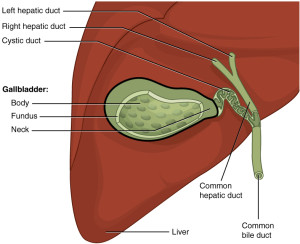The gallbladder is one of the organs, but generally remains obscure or unnoticed until something goes wrong. Troubles with the heart, lungs, brain or other significant organs includes symptoms that are easily observable, but the symptom and signs of gallbladder issues are identified when consulting with a physicians. Here’s a few indicators and signs as well as a brief introduction to the function of the gallbladder of gallbladder dysfunction.
 The Use of Your Gallbladder
The Use of Your Gallbladder
The gallbladder can be found beneath your liver. The bile juices have been stored within this tiny sac. The bile juices are essential for digestion and breaking of fatty foods. Gallbladder connects through the duct, in which it releases bile.
The signs and symptoms of gallbladder issues don’t occur unless something blocks the release of bile juices or totally slows down.
Sign and Symptoms of Gallbladder-Related Issues
If something goes wrong with your gallbladder, you may feel pain in the upper places below the diaphragms. Particular indication and symptoms might arise in most problems. So, physicians attempt to recognize symptoms to comprehend the state of your gallbladder. A malfunctioning gallbladder’s symptoms include:
- Pain in the chest
- Nausea, vomiting and fever
- Unusual feeling of fullness
- Severe pain in the upper abdominal area
- Sharp, crampy or dull pain in the upper abdominal area
- Abdominal pain that worsens after eating oily foods
- Abdominal pain that worsens on taking deep breaths
- Abdominal pain that pulsates to the Perfect shoulder blade along with your back areas
- Persistent indigestion and related symptoms like heartburn or excessive gas
- Unusual vibration and chills
- Yellow skin and eyes as observed in jaundice
- Unusual tenderness in the upper right portion of the abdomen
- Changes in the feces color (become milder as clay)
Gallbladder related health issues:
- Gallstones: the stone formation in the gallbladder or cholelithiasis has become the most common health issue that may impact the proper performance of your gallbladder. The formation gallbladder stones don’t cause any symptoms or signs in almost ninety percent patients unless gallstones become quite big. The signs and symptoms arise just when the passing of bile discharge is blocked. Gallstones may remain unnoticed for years, and gallstones of more than 10 years may not contribute to any indicators. With x-rays conducted through exams reveal stone formation in the gallbladder, they’re diagnosed.
- Biliary colic: when the gallstones block cystic duct, patients experience severe pain in the upper stomach region. The pain occurs due to the contraction of gallbladder against the hard rock. The pain may be constant or spasmodic, but lasts for only a couple of hours, occurring rather infrequently. The following episode of biliary colic pain may recur after a few decades.
- Gallbladder Infection: the redness of gut is called cholecystitis. Inflammation of the gallbladder may be caused by factors like infections, excessive drinking, and blockage of duct because of tumors or gallstones that lead to build up in the gut. The gallstones are the most frequent cause of cholecystitis because persistent soreness from rocks within the gallbladder makes it painful and inflamed. The condition becomes worse if the intestinal bacteria also infect the gallbladder. It causes a surgical emergency if the gallbladder ruptures due to infections. If fever accompanies suspected inflammation of gallbladder, immediate medical care becomes mandatory.
- Dysfunctional gallbladder: the persistent irritation of gallstones and recurring inflammations or infections of the gut may impact the proper functioning of your gut. Indigestion-related symptoms and signs like increased gas fullness, and heartburns may be a Sign of gallbladder that is dysfunctional. The symptoms that are obscure become more persistent with condition of your stomach and more. Some individuals suffer from ten or more episodes of diarrhea per day.
The bile juices play a very important role in the digestion of your food. A healthy digestive system holds the functioning of various body organs. So, if you observe any sign and symptoms associated with the gallbladder problem ask your physician for care and appropriate diagnosis of your health.
(image source)
